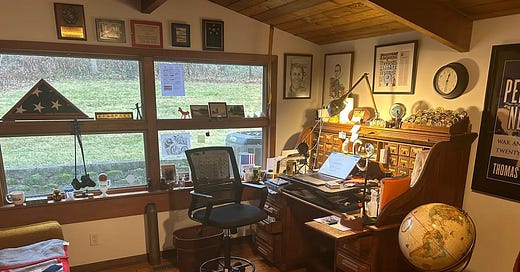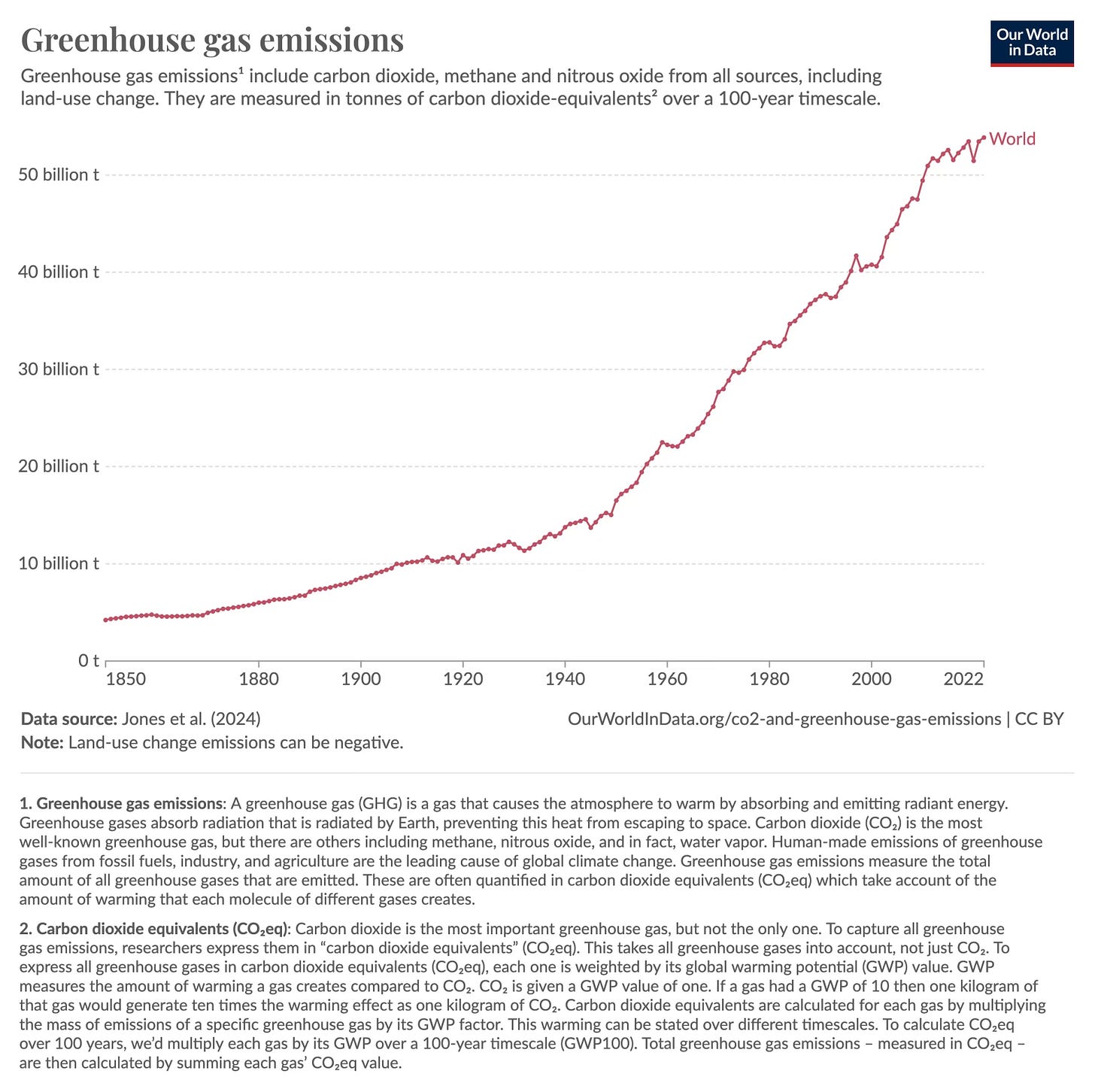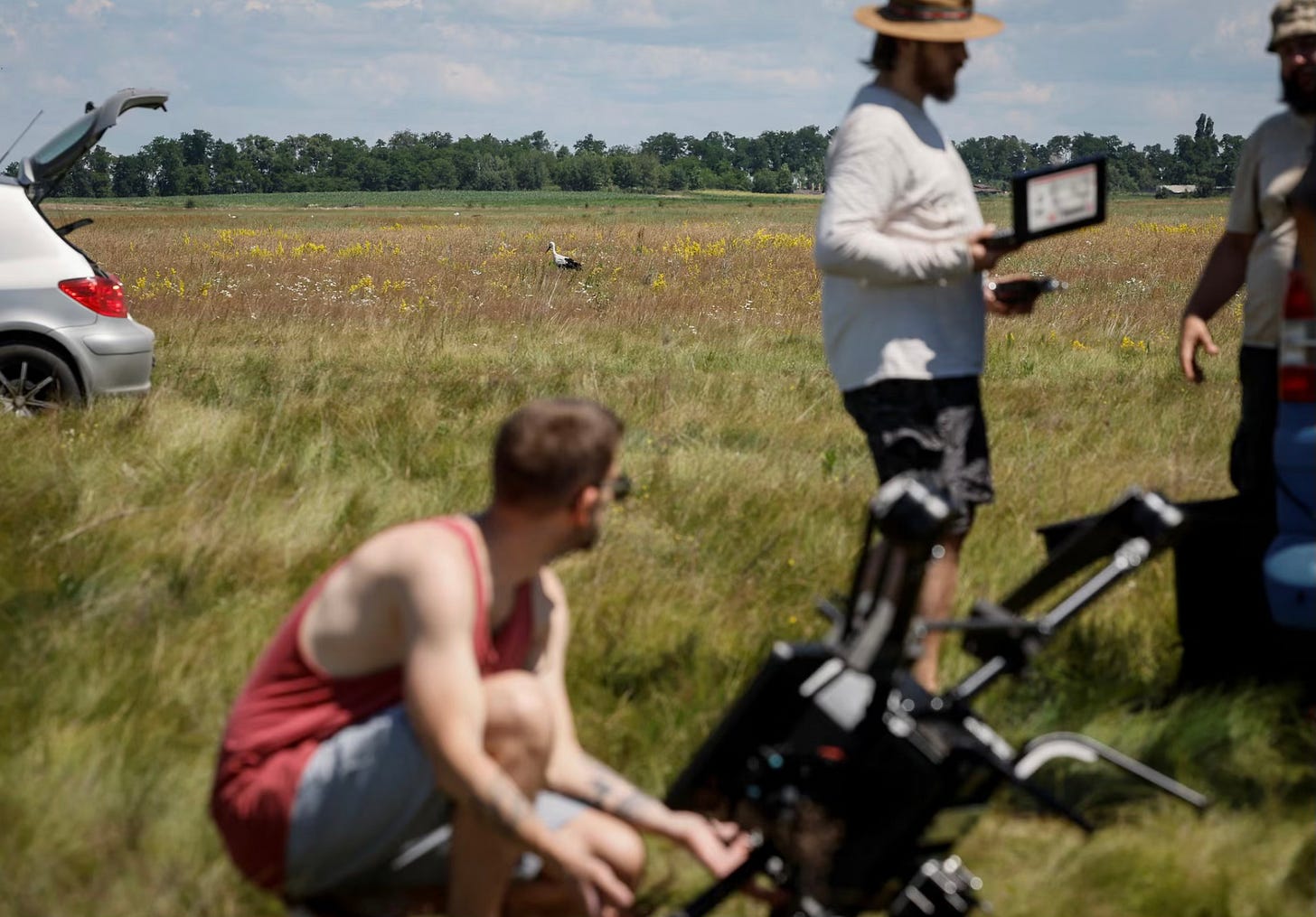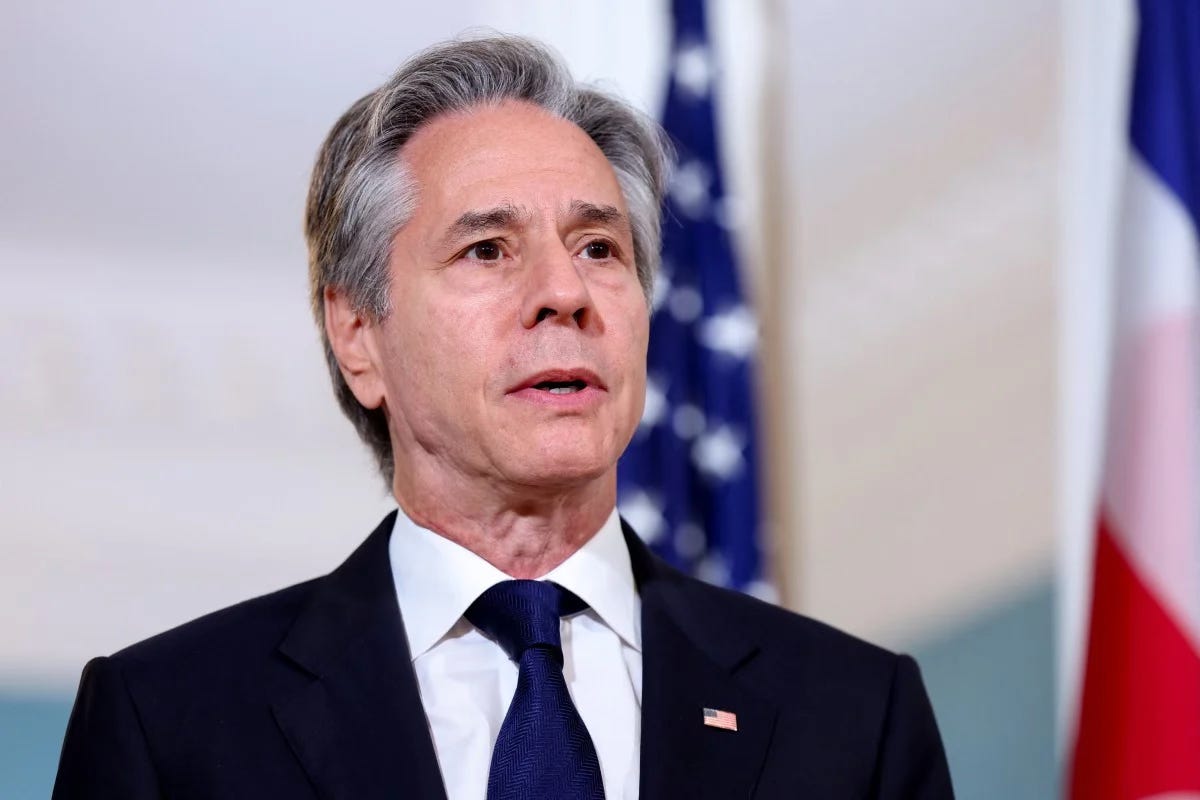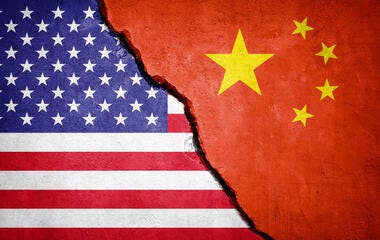1) Climate turning point?
YALE CLIMATE CONNECTIONS: A major milestone: Global climate pollution may have just peaked
NYT: Why the Era of China’s Soaring Carbon Emissions Might Be Ending
WAPO: The Persian Gulf is enduring life-threatening heat indexes above 140 degrees
Last time, years ago, when I was in the Persian Gulf, I had some time to spare and, since I was staying within walking distance of the water, I strolled over and waded around for a bit. The sensation was unreal: like stepping into a warm/hot bathtub. Having lived for years in New England and surfed there plenty, that feeling was startling: how could a body of water that BIG get that WARM?
Latest readings from the PG indicate water temps in the mid-90s — inconceivable to most people. But that’s not going to kill people. Heat indexes above 140 degrees Fahrenheit — that will kill people.
Understand, if that’s the PG today, that region is easily looking at another half dozen degrees by mid century, meaning the unlivability index (if such a thing exists) will skyrocket.
This is why, for hope’s sake alone, it is so important to hear that global GHG emissions may be peaking. From Yale:
According to the Carbon Monitor Project, the total global climate pollution released between February and May 2024 declined slightly from the amount released during the same period in 2023. Many experts believe that the clean energy transition has reached the point where emissions will stabilize and then begin to decline. The critical milestone of peak climate pollution might be happening right now.
Is that the peak up ahead? One wonders after this inexorably long climb:
All the clean technologies are driving this plateauing effect. Yes, the all-of-the-above approach remains forgivable for developing markets, but it’s the mature markets — and particularly China — embracing solar and wind and EVs that is driving this history-bending development.
China, of course, is the key:
“The important thing to understand is that when China’s emissions stop growing, it likely follows that the world’s stop growing, too,” said Dave Jones, global insight director at Ember, an energy think tank.
This is the power of China’s demand being altered. China’s demand for electricity drives world-shaping developments, and so, when that demand is better met, the world is different.
Last year alone, China installed more solar panels than the United States has in its entire history, and connected most of them to its electricity grid.
Almost two-thirds of big wind and solar plants under construction globally are in China, according to a report last week from Global Energy Monitor. That is more than eight times the wind and solar capacity being planned in the United States.
This is a riser trying very hard to act like a responsible stakeholder. Will a true Chinese peak emerge? Yet to be seen.
But this may be one of the biggest corners humanity ever turns, and that’s encouraging.
2) China’s got the beef! Or chicken! Or just protein in general!
SCMP: Average Chinese national now eats more protein than an American: UN food agency
Long considered a complete disaster in the making: God forbid China, in its rise, ever matches America’s deep consumption of protein. How many Earths would be required for that!?!
Well, it’s happened. And life goes on, along with — likely — the rise of cultured (lab grown) meat, a key Chinese government R&D focus going back some years now.
Speaking of lab-grown meat …
3) It was called “Soylent Green”
GUARDIAN: US oil company ran 1977 article predicting climate crisis could cause starvation
Guardian breathlessly reports that Marathon Oil once published some analysis in 1977 saying that climate change would lead to mass starvation.
Brilliant!
Except the screenplay for 1973’s Soylent Green beat it by a mile.
It’s all there in the opening montage: images of industrialization leading to pollution and environmental degradation over time. Characters thereupon discuss how the changing climate has made it nearly impossible to grow food, reminiscing about a time when fresh produce and meat were readily available.
Seriously.
Everybody remembers Soylent Green as the “population bomb” movie when it was really the first great climate change movie. Soylent Green the population movie was culturally canceled by the Children of Men in 2006. Where have all the babies gone?
Two great movies I often cite in my brief. Or, as I quipped in America’s New Map:
For the world, there is genuine uncertainty about whether humanity has conclusively left behind the threat of the Malthusian trap. Absent climate change, the answer may have been a decisive yes, as world fertility drops below the replacement rate well before this century’s end while agricultural productivity inexorably rises. But with climate change so dramatically remapping the world’s distribution of arable land, any such judgment remains literally up in the atmosphere. In high-concept Hollywood terms, think of it as Soylent Green meets Children of Men with the third act yet to be written. [emphasis mine]
Bazinga!
4) For make benefit glorious nation!
NYT: Why China Is So Interested in Kazakhstan
China targets Kazakhstan big time with its Belt and Road Initiative because the mineral and energy and food resources there are all big time.
Name a mineral critical to the Green Revolution and Kazakhstan has it — in abundance:
The world’s transition to renewable energy, including electric cars, requires huge amounts of nickel, copper, lithium and other so-called critical minerals. Kazakhstan has many of them, and China, the biggest producer of electric vehicles and batteries, is right next door and eager to buy.
“Everything is going to China,” Mr. Rakishev [Kazakh entrepreneur] said.
If Russia was still in charge of Kazakhstan, we wouldn’t been seeing this. But China is incentivized (at home) and ambitious (global). This is a technology race that matters — unlike so many of those military ones we Americans naturally obsess over.
Remember my bit about how, in modern globalization, the flag follows trade? This is what it looks like today:
“If somebody is doing geological exploration, I don’t care what flag they carry,” said Kanat Sharlapayev, Kazakhstan’s minister of industry and construction and a former Citigroup executive in Kazakhstan and the Middle East.
This is not about how many military bases you have around the world; this is about connectivity (infrastructure) — pure and simple.
As I like to note for fans of The Pentagon’s New Map: My imagined SysAdmin Force is alive and well; it’s just called China’s Belt and Road Initiative — a Force of Connectivity the world over.
Yes, the Europeans and the Americans are also there in Central Asia, but as our Kazakh minister put it:
“Geography cannot be ignored, of course.”
The Chinese come bearing serious gifts:
It’s not just critical minerals that China wants from Kazakhstan. Beijing has invested billions of dollars, much of it as part of its Belt and Road foreign policy initiative, into upgrading Kazakhstan’s railways and other infrastructure to establish easier trade routes to Europe, an essential trading partner of China.
China’s economic influence is now apparent across the country. In Almaty, Kazakhstan’s wealthiest city, new car dealerships for Chinese electric vehicle brands are popping up.
This is why I state in the book that the BRI cannot be stopped and — frankly — should not be stopped. China is the Great Connector of note in the world economy today. Like it or not, that’s God’s work when it comes to progress for those nations still looking to rise.
5) Fly my pretties! Fly!
REUTERS: Ukraine rushes to create AI-enabled war drones
Ukraine, current Mother of Invention in the great Military Singularity to come, is using AI to help its air and land drones work together in targeting. Adding AI makes drones less susceptible to jamming from the other side.
AI is also a sheer necessity: once the swarm gets beyond a dozen, it moves beyond the human capacity to steer.
Again, check out Ukraine’s bleeding-edge military industrial complex:
Moment of production meeting moment of demand/use.
6) Migrants go up, murder goes down
NYT: Immigrants and crime
The horrible lies propagated by Trump’s GOP. Shameful, indeed.
7) This is how we do it
SCMP: US initiative to produce semiconductors in Latin America announced by Antony Blinken
Give it up to Blinken.
This is a smart and long overdue move.
The effort, intended to counter China, will expand chip manufacturing in Mexico, Costa Rica and Panama, and possibly other countries in the future
A Western Hemispheric technology “union” of sorts? Fabulous.
Let’s add more.
8) My lunch with Brian Eno
NYT: This Documentary About Brian Eno Is Never the Same Twice
I am a huge fan and always will be. I used to pen the following graffiti in college:
Eno is god is dead is Eno!
Completely asinine, I know. It came to me in a moment of great pot-induced clarity.
And then, in a Pop!Tech years ago, I caught his talk. Mine was right after. We met in the green room and made organizers switch around our meal assignments so we could have lunch together.
It was a big-time thrill for this Talking Heads fan. We talked global affairs and making music.
It remains my favorite memory of attending various big-ideas conferences — even outpacing my TED Talk in 2005.
Eno, always the inventive and iconoclast, would only agree to a bio-doc if the director layered in the technology that scrambles the deck of cards each and every time it is viewed, so that no two versions are the same.
I plan, of course, on multiple viewings.
9) Back to the future
EUROMAIDN PRESS: Russia needs ceasefire as Soviet-era weapon stocks deplete
Leveraging an Economist chart via a third-party.
Man, the data makes it hard to say that the Russians are winning this war, right? Except Putin doesn’t seem to care what it costs in blood and treasure.
The drone-led devastation of a conventional military force marches on, giving us a huge insight into the growing pointlessness of conventional warfare for territorial gain.
This is why our re-upping on military aid to Ukraine last year was so crucial:
Experts estimate that at current attrition rates, Russia’s ability to refurbish tanks and infantry vehicles from storage will reach a “critical point of exhaustion” by late 2025. This may force Russian forces to adopt a more defensive posture, possibly as early as the end of summer 2024.
Talk about a ROI!
10) Too hot to choo-choo?
NYT: Amtrak Passengers Face Record Delays From Extreme Weather
Kind of hard to believe, but there it is: hot conditions far outpacing cold ones in accounting for Amtrak weather-related delays.
As the planet rapidly warms, train delays and breakdowns are becoming more frequent as America’s antiquated rail infrastructure struggles to remain functional during prolonged extreme weather events that were not typical when the system was constructed.
Infrastructure built for another Earth.
We are just beginning to realize how big our adjusting and adapting to climate change will be — and how costly.
11) This is progress
AXIOS: The world's poor get richer
US-style globalization at work:
The trend underscores the astonishing decline in inequality that we've seen over the past couple of decades.
Good stuff.
12) Separate sciences
UNIVERSITY WORLD NEWS: Study shows drastic decline in US-China scientific exchange
The gist:
Since 2016, the year Donald J Trump was elected president of the United States, scientific cooperation between that country and China has markedly decreased, says a new paper from the Cambridge, Massachusetts-based National Bureau of Economic Research.
Building a Wall Around Science: The effect of US-China tensions on international scientific research (“Building a Wall”) examines quantitative data in three areas: STEM trainee mobility (ie, the likelihood of a Chinese student doing his or her PhD in the US and remaining afterwards); the likelihood of Chinese researchers in China using scientific research originating from the US and vice versa; and scientific productivity as measured by production of peer-reviewed papers.
In almost every area, the study shows that “geopolitical tensions at a much lower level than the formal expulsion of academics or violent warfare can lead to a significant shift in scientist mobility”.
Science used to be a Western thing, like globalization in its “Free World” infancy (my childhood and youth).
Now it’s a global thing, like globalization in its peak form.
Building walls, both real and policy-driven, does nobody any good — not with the agenda of global challenges we humans now collectively face.

